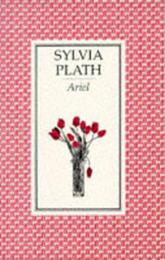
|
Ariel
Paperback / softback
Main Details
| Title |
Ariel
|
| Authors and Contributors |
By (author) Sylvia Plath
|
| Physical Properties |
| Format:Paperback / softback | | Pages:96 | | Dimensions(mm): Height 198,Width 130 |
|
| Category/Genre | Poetry by individual poets |
|---|
| ISBN/Barcode |
9780571086269
|
| Classifications | Dewey:811.54 |
|---|
| Audience | | General | | Tertiary Education (US: College) | | Professional & Vocational | |
|---|
| Edition |
Main
|
|
Publishing Details |
| Publisher |
Faber & Faber
|
| Imprint |
Faber & Faber
|
| Publication Date |
8 May 2001 |
| Publication Country |
United Kingdom
|
Description
The poems in this book, including many of her best known such as 'Lady Lazarus', 'Daddy' and 'Fever 103', were all written between the publication in 1960 of Sylvia Plath's first book, The Colossus, and her death in 1963.If the poems are despairing, vengeful and destructive, they are at the same time tender, open to things, and also unusually clever, sardonic, hardminded . . . They are works of great artistic purity and, despite all the nihilism, great generosity . . . the book is a major literary event'. A. Alvarez in the Observer.
Author Biography
Sylvia Plath (1932-1963) was born in Boston, Massachusetts, and studied at Smith College. In 1955 she went to Cambridge University on a Fulbright scholarship, where she met and later married Ted Hughes. She published one collection of poems in her lifetime, The Colossus (1960), and a novel, The Bell Jar (1963). Her Collected Poems, which contains her poetry written from 1956 until her death, was published in 1981 and was awarded the Pulitzer Prize for poetry.
Reviews"Sylvia Plath's last poems have impressed themselves on many readers with the force of myth. They are among the handful of writings by which future generations will seek to know us and give us a name."-- "Critical Quarterly""It is fair to say that no group of poems since Dylam Thomas's "Deaths and Entrances" has had as vivid and disturbing an impact on English critics and readers as has "Ariel." Sylvia Plath's poems have already passed into legend as both representative of our present tone of emotional life and unique in their implacable, harsh brilliance...These poems take tremendous risks, extending Sylvia Plath's essentially austere manner to the very limit. They are a bitter triumph, proof of the capacity of poetry to give to reality the greater permanence of the imagined. She could not return from them."-- George Steiner, "The Reporter"
|